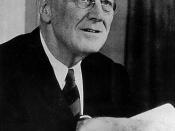While the New Deal launched by President Franklin D. Roosevelt did help to get the United States economy going during and after the Great Depression, it was not a success. The Great Depression was caused by several factors. Among these was the rise of consumer debt, runs on the banks, corporations making more money but not raising wages, and a growing gap between the rich and the poor. The many programs created during the First and Second New Deals did address much of the problems of the Great Depression, but most of them were not outright successes. The most successful of the programs were the banking acts and the Social Security Act. The programs that did not work out as planned were the Civil Works Administration, the Public Works Administration, the National Recovery Administration, and the Agricultural Adjustment Act. There were other programs that did help out, but did not have much success as was hoped for them.
While there were a couple programs that worked quite well, most of the programs designed to help get America out of the Great Depression did not work.
The Great Depression started in the 1920s and lasted until the mid-thirties. The economy started going down due to many factors. Consumers were purchasing more and more on credit instead of waiting until they had the money. They would then pay high interest rates on the debt that they owed. The next factor was that the rich were getting richer and the poor were getting poorer. This was partially due to corporations that were getting huge profits off of their workers, yet they were still paying the workers the same, low wages. Another factor was that there were high tariffs on European goods. This led to low European investments in U.S. companies. Also, there...


